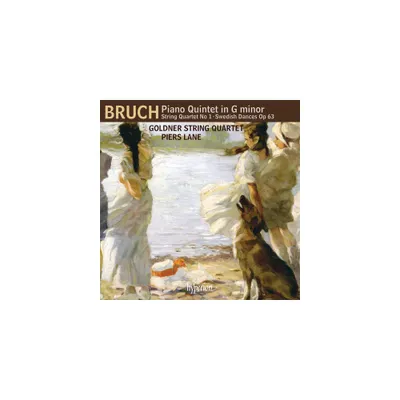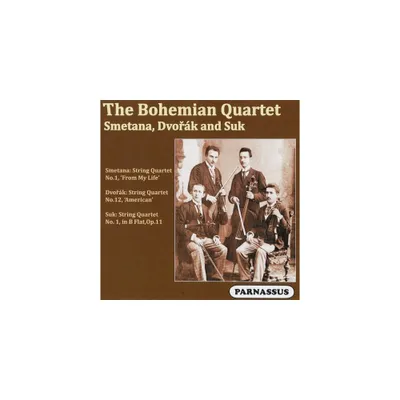Home
Dvorák: String Quartet No. 2; Bagatelles; Rondo in G minor
Loading Inventory...
Barnes and Noble
Dvorák: String Quartet No. 2; Bagatelles; Rondo in G minor
Current price: $21.99


Barnes and Noble
Dvorák: String Quartet No. 2; Bagatelles; Rondo in G minor
Current price: $21.99
Loading Inventory...
Size: OS
*Product Information may vary - to confirm product availability, pricing, and additional information please contact Barnes and Noble
Not one of the
Dvo¿ák
works on this album is exactly common, but for lovers of the composer, this will be the main attraction, and the venerable
Fine Arts Quartet
is to be commended for a genuinely adventurous program. The
Bagatelles for two violins, cello, and harmonium, Op. 47
, are sometimes used individually to fill out a program of chamber music, but they really deserve to be heard as a set; the first and third pieces begin similarly but then diverge (an unusual move in a light genre), and generally, they evolve from very catchy melodies into harmonic complexities as they evolve over three or four minutes. If these works were not written for the harmonium, a common enough instrument at antique malls but less so in classical contexts, they might well be repertory standards. Hardly less interesting is the
String Quartet No. 2 in B flat major
, an early work that has no opus number because it was never published.
tried to destroy all the copies but fortunately missed a few. The work has nothing of the Czech idiom of the mature
. Highly chromatic in spots, it represents nothing less than an attempt to transfer Wagnerian style to the string quartet medium. Clocking in at over 50 minutes, it is a fascinating glimpse into the mind of the up-and-coming composer. The program ends with a little-known and lively
Rondo in G minor, Op. 94
, which exists in several versions. The rather slow tempos in the
String Quartet No. 2
expose some problematic intonation, but it is valuable to have a fresh recording of this work. The album was perhaps not conceived as a whole; it was recorded at two different locations (not precisely similar acoustically, but both clear and unobjectionable). Nevertheless, it is a wonderful romp through some odd corners of the
repertory that will be valued highly by those who love the composer. ~ James Manheim
Dvo¿ák
works on this album is exactly common, but for lovers of the composer, this will be the main attraction, and the venerable
Fine Arts Quartet
is to be commended for a genuinely adventurous program. The
Bagatelles for two violins, cello, and harmonium, Op. 47
, are sometimes used individually to fill out a program of chamber music, but they really deserve to be heard as a set; the first and third pieces begin similarly but then diverge (an unusual move in a light genre), and generally, they evolve from very catchy melodies into harmonic complexities as they evolve over three or four minutes. If these works were not written for the harmonium, a common enough instrument at antique malls but less so in classical contexts, they might well be repertory standards. Hardly less interesting is the
String Quartet No. 2 in B flat major
, an early work that has no opus number because it was never published.
tried to destroy all the copies but fortunately missed a few. The work has nothing of the Czech idiom of the mature
. Highly chromatic in spots, it represents nothing less than an attempt to transfer Wagnerian style to the string quartet medium. Clocking in at over 50 minutes, it is a fascinating glimpse into the mind of the up-and-coming composer. The program ends with a little-known and lively
Rondo in G minor, Op. 94
, which exists in several versions. The rather slow tempos in the
String Quartet No. 2
expose some problematic intonation, but it is valuable to have a fresh recording of this work. The album was perhaps not conceived as a whole; it was recorded at two different locations (not precisely similar acoustically, but both clear and unobjectionable). Nevertheless, it is a wonderful romp through some odd corners of the
repertory that will be valued highly by those who love the composer. ~ James Manheim


















